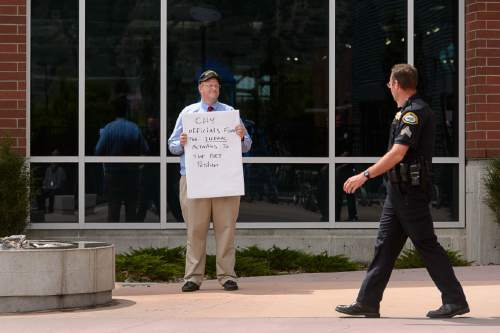This is an archived article that was published on sltrib.com in 2016, and information in the article may be outdated. It is provided only for personal research purposes and may not be reprinted.
Admittedly, selling mass transit in Utah County is an uphill battle, but city officials in Provo and Orem are just making the hill steeper.
The Utah County Clerk-Auditor last week slapped employees in both cities with $250 fines for using their city email accounts to advocate against a citizens' petition drive opposing a "bus rapid transit" route (BRT) connecting the two cities.
It is the latest in a long and twisted saga to bring BRT to one of the most heavily trafficked routes in Utah. BRT, something like a train on rubber wheels, uses double-length buses that would travel on dedicated lanes for most of their route. The idea is that they can cover the distance faster than regular buses that must compete with traffic, but they do it at a price far below a light-rail line.
Officials in both cities are frustrated with the petition drive because, even if it is successful, it can't actually stop BRT, which is a Utah Transit Authority project mostly on state highways. The petitions would only reverse the deal the cities made with UTA for improvements on the route. The petitioners maintain that, without the local commitment, federal funding for the project could go away. That federal funding is budgeted, but Congress hasn't approved the budget yet. UTA is confident enough that it will begin the project this summer.
The emails are not the only hindrance put on petitioners. Provo City Police have also been requiring them to set up in a "free speech zone" on the sidewalk outside the Provo Recreation Center or pay to rent a room in the center. The city has a legal opinion to justify it, but it's still a poor move, setting up the dynamic where the city is fighting its own citizens. And don't think that citizens who have nothing to do with the petition aren't noticing that dynamic.
It doesn't have to be. The cities can and should put out good information on BRT and the cities' role, and it also should accommodate a legal petition process by its residents. That, frankly, is more important than this BRT route, in large part because this won't be the last transit project.
Public transportation has always been a hard sell in Provo-Orem. Some of it is distrust of government, and some of it is just demographics. A Utah County family in a minivan arguably is "mass transit" already. Nevertheless, the conditions that encourage more transit — traffic, pollution and the cost of owning cars — are all present and growing in the county.
If the cities resort to this with one project, they set themselves up for years more of fighting their own citizens for wanting to participate in their government. That's no way to get people on the bus.



